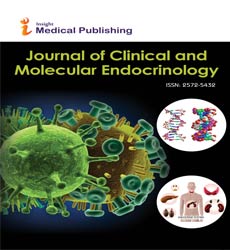Does mRNA Stability Play a Role in Thyroid Cancer?
Bogusz Trojanowicz and Cuong Hoang-Vu
Bogusz Trojanowicz1* and Cuong Hoang-Vu2
1Department of Internal Medicine II, Martin-Luther-University Halle-Wittenberg, Germany
2Clinics of General, Visceral and Vascular Surgery, Martin-Luther-University Halle-Wittenberg, Germany
- *Corresponding Author:
- Trojanowicz B
Department of Internal Medicine II
Martin-Luther-University Halle-Wittenberg
Ernst-Grube-Str. 40, 06120 Halle (Saale), Germany
Tel: +49-345-557 3386
Fax: +49-345-557 3389
Email: bogusz.trojanowicz@uk-halle.de
Received date: September 03, 2016; Accepted date: September 09, 2016; Published date: September 12, 2016
Citation: Trojanowicz B, Cuong HV (2016) Does mRNA Stability Play a Role in Thyroid Cancer? J Clin Mol Endocrinol 1:22. doi: 10.21767/2572-5432.100020
Copyright: © 2016 Trojanowicz B, et al. This is an open access article distributed under the terms of the Creative Commons Attribution License, which permits unrestricted use, distribution, and reproduction in any medium, provided the original author and source are credited.
Abstract
In the search for novel molecular markers for thyroid carcinoma, we found that both proteins involved in the regulation of mRNA stability, AUF1 and HuR, may play a particular role in the tumor progression. Functional, these proteins may bind and regulate the stability of mRNAs related to the cell cycle leading to uncontrolled growth and progression of tumor cells.
Letter to Editor
Recently, molecular techniques engaging genomics and proteomics led to the rapid progress in identification and application of diagnostic markers for thyroid carcinoma [1], which belongs to the most common endocrine malignancy [2]. Adequate identification of the suspicious thyroid nodules based on the classical histo(cyto)pathological evaluation or biomarker expression is a crucial step determining proper diagnosis and medication. With regards to the novel biomarkers for thyroid cancer, we pay particular attention to the proteins related to mRNA stability. We found that Adenylate-Uridylate-rich element (ARE) binding proteins AUF1 and HuR are able to bind and regulate the stability of many cell cycle regulators involved in the growth and proliferation of thyroid cancer cells. Our initial data demonstrated that cytoplasmic AUF1 may promote thyroid carcinogenesis by disturbing the stability of mRNAs encoding cyclin-dependent kinase inhibitors. Additionally, we found that patients suffering from thyroid carcinoma express obviously more AUF1 in the cytoplasma as compared to goiter and adenoma tissues [3,4].
More recently, we focused our investigations on total tissue lysates, which could be compared with the fine needle aspiration (FNA) samples. We found that the low protein levels of AUF1 and HuR detected in benign and adenoma tissues are extremely high in thyroid carcinoma tissues. More importantly, based on the expression of AUF1 and/or HuR we were able to discriminate between follicular adenoma (FA) and follicular carcinoma (FTC) of the thyroid gland [5].
We are aware that the functional or biological rationale of the AUF1 or HuR remains not entirely understood for thyroid gland, both markers were involved in the regulation of mRNA stability and they proved to be of a great accuracy.
Although we cannot exclude the participation of other factors related to mRNA stability, understanding how thyroid carcinoma attains distinct regulation of the stability of various ARE-containing mRNAs remains an open question.
References
- Carpi A, Mechanick JI, Saussez S, Nicolini A (2010) Thyroid tumor marker genomics and proteomics: diagnostic and clinical implications. J Cell Physiol 224: 612-619.
- Parker SL, Tong T, Bolden S, Wingo PA (1997) Cancer statistics, 1997. CA Cancer J Clin 47: 5–27.
- Trojanowicz B, Brodauf L, Sekulla C, Lorenz K, Finke R, et al. (2009) The role of AUF1 in thyroid carcinoma progression. EndocrRelat Cancer 16: 857-871.
- Trojanowicz B, Dralle H, Hoang-Vu C (2011) AUF1 and HuR: possible implications of mRNA stability in thyroid function and disorders. Thyroid Res 4: S5.
- Trojanowicz B, Sekulla C, Dralle H, Hoang-Vu C (2016) Expression of ARE-binding proteins AUF1 and HuR in follicular adenoma and carcinoma of thyroid gland. Neoplasma 63: 371-377.
Open Access Journals
- Aquaculture & Veterinary Science
- Chemistry & Chemical Sciences
- Clinical Sciences
- Engineering
- General Science
- Genetics & Molecular Biology
- Health Care & Nursing
- Immunology & Microbiology
- Materials Science
- Mathematics & Physics
- Medical Sciences
- Neurology & Psychiatry
- Oncology & Cancer Science
- Pharmaceutical Sciences
